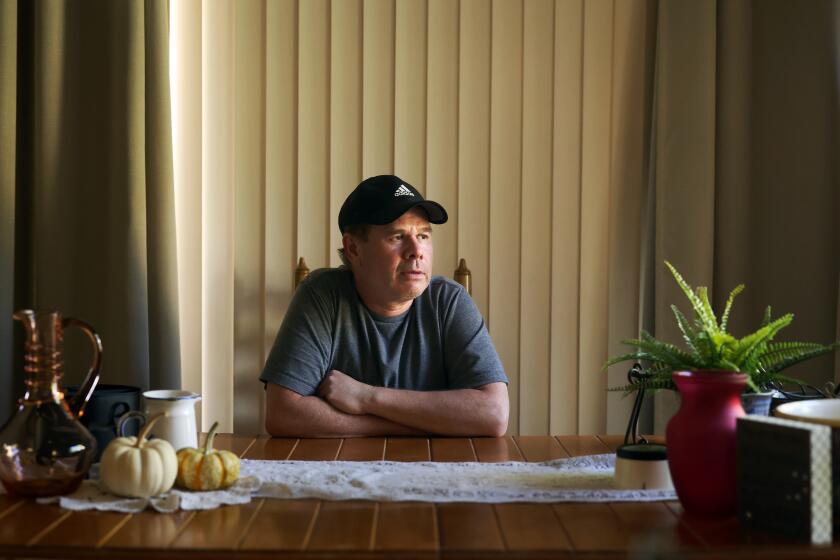Op-Ed: Why phone calls from prison should be free

- Share via
Angel Rice’s second job is unpaid, and the hours stink. They start at 6 a.m. when she checks her phone for messages that have come in overnight from women who are struggling to support a family member locked up in a California state prison.
Nothing they can ask would surprise Rice, whose own husband is incarcerated in Imperial County, 150 miles from her Rancho Cucamonga home. But with regularity, their questions boil down to the stress of paying to stay connected with a loved one inside. “I’m going into debt to keep my children in touch with their father,” they might say. “But I have to keep my family connected. What am I going to do?”
It’s a dilemma that led Rice and Abby Salim, whose husband is incarcerated in Marin County, to found Empowering Women Impacted by Incarceration — an all-volunteer network of thousands of California women helping each other in the struggle to support incarcerated loved ones. And it’s why the group, along with other such organizations, is going all out to urge Gov. Gavin Newsom to sign the Keep Families Connected Act, Senate Bill 1008, authored by state Sen. Josh Becker (D-Menlo Park).
The bill would make all prison phone calls free. If Newsom wants to lift a burden off some of the most vulnerable families in our state, it’s hard to imagine legislation that would deliver a bigger impact at a lower cost.
Currently when Rice wants to communicate with her husband, she pays a premium that’s only charged to those communicating with people in prisons, jails and youth detention centers. To get incarcerated people’s calls, you must set up an account using a debit card or a credit card, an onerous process in itself and not available to all families with a loved one who’s imprisoned. Once an account is established, when a call comes in, the charges roll out. (You can’t call in to jail or other lockdowns.)
Hundreds of mentally ill detainees incarcerated across California in recent years have languished in jail long after being declared incompetent to stand trial.
For Rice, the costs come to $3 for every 15-minute video call; about $20 a week to send emails (5 cents to send and 5 cents to receive); 37 cents for a 15-minute audio-only call (prison phone calls cut off after 15 minutes).
What about visiting in person? Rice spends $100 on a tank of gas to drive to Imperial County. Then it’s $70-plus for a hotel room, and around $40 for food for her husband and children during the visit. (She also spends about $500 every three months on food care packages that the prisons offer.) And then there are unexpected costs, like the time her car broke down during the drive in the middle of the desert.
The expenses add up. They partly explain why 1 in 3 families with an incarcerated loved one go into debt, $13,000 on average, according to a study led by the Ella Baker Center. One in 4 women, and 2 in 5 Black women, are related to someone who is incarcerated.
“Our husbands or fathers are incarcerated, so we are the breadwinner right now.,” Rice said. “We are enduring all those costs right now.”
The government can’t regulate the cost of an overnight stay in Imperial County, or stop old cars from breaking down, but it can make sure the cost of prison communication is fair.
The prison telecom industry is a monopoly dominated by three corporations. It’s worth $1.4 billion, and yes, it raises revenue for state and local coffers too, but at what cost? Research shows that the more incarcerated people stay in touch with their families, the better they do when they get out. So why make it harder for that to happen?
There is momentum for reform in California. All calls coming from the San Francisco jails are now free. The San Francisco sheriff testified in support of SB 1008, saying that moving to free calls was easy to implement and had a “calming effect on the environment in the jail.” Calls are also free from San Diego jails. And the California Public Utilities Commission has at least capped the top price carceral facilities and communications companies can charge for calls at 7 cents a minute. (The statewide average before the cap was 31 cents a minute.) The state prison system has made some calls free during the pandemic too, but that program is expected to expire.
Some may think that 37 cents to get a call from a loved one in prison is no big deal. But Rice knows better, and she hears from women all the time who don’t pick up when the phone rings and their incarcerated son or father is on the line because they can’t afford the charge — it’s a harrowing decision.
And when it comes time for someone to be released, the whole system makes it all but impossible for them to call around to secure a job or a place to live before they’re back outside.
To implement SB 1008 would cost the state an estimated $12 million a year — real money but only about 0.1% of California’s $14-billion prisons budget.
There’s more to be done to right all the wrongs of the many prison-corporate partnerships that make money off of desperate mothers, wives and grandmothers of inmates. But Newsom signing the Keep Families Connected Act is a start.
In the meantime, Rice will keep checking her phone for messages from families in the Empowering Women network. Many nights she’s on the phone with them past midnight. “Everyone is looking for help,” she says, “and they don’t know where to get it.”
Anne Stuhldreher directs the Financial Justice Project in the San Francisco treasurer’s office and is a fellow in the Aspen Institute’s Financial Security Program.
More to Read
A cure for the common opinion
Get thought-provoking perspectives with our weekly newsletter.
You may occasionally receive promotional content from the Los Angeles Times.










